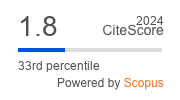Noise Reduction in RTL-SDR using Least Mean Square and Recursive Least Square
Pengurangan Noise pada RTL-SDR Menggunakan Least Mean Square dan Recursive Least Square
Abstract
Noise reduction is an important process in a communication system, one of which is radio communication. In the process of broadcasting radio Frequency Modulation (FM) often encountered noise so that listeners find it difficult to understand the information provided. In the past, noise reduction used traditional filters that were only able to filter certain frequencies. However, for future technologies an adaptive filter is needed that can dynamically reduce noise effectively. Register Level-Software Defined Radio (RTL-SDR) can capture signals with a very wide frequency range but has a less clear sound quality. So it needs to be done noise reduction. In this study, two methods are used, namely Least Mean Square (LMS) and Recursive Least Square (RLS). The data used five radio stations in Malang. The results showed that the LMS algorithm is stable but has a slow convergence speed, whereas the RLS algorithm has poor stability but has a high convergence speed. From the test, it can be concluded that the performance of RLS is better than LMS for noise reduction in RTL-SDR. The best performance is the reduction of White Noise using RLS on the Oryza radio station with an Normalized Weight Differences (NWD) value of -13.93 dB.
Downloads
References
H. Xia, K. Yang, Y. Ma, Y. Wang, and Y. Liu, “Noise Reduction Method for Acoustic Sensor Arrays in Underwater Noise,” IEEE Sens. J., vol. 16, no. 24, pp. 8972–8981, 2016.
R. I. Sokolov and R. R. Abdullin, “Research of optimal pulse signal reception quality by mean risk minimum criterion with action of Gaussian and non-Gaussian noise,” 2016 Int. Conf. Comput. Tech. Inf. Commun. Technol. ICCTICT 2016 - Proc., pp. 97–100, 2016.
I. Landa, M. M. Vélez, A. Arrinda, R. Torre, and M. Fernández, “Impulsive noise characterization and its effect on digital audio quality,” IEEE Int. Symp. Broadband Multimed. Syst. Broadcast. BMSB, vol. 2015-Augus, pp. 4–6, 2015.
A. Brown, S. Garg, and J. Montgomery, “Automatic and Efficient Denoising of Bioacoustics Recordings Using MMSE STSA,” IEEE Access, vol. 6, no. X, pp. 5010–5022, 2017.
S. S. Neelakanthmath, “Performance Analysis of Least Mean Square and Recursive Least Square Channel Estimation Techniques under Multipath Fading Environmental Conditions,” no. 1, pp. 2–6, 2017.
A. Quadri, M. R. Manesh, and N. Kaabouch, “Noise Cancellation in Cognitive Radio Systems : A Performance Comparison of Evolutionary Algorithms,” 2017.
Y. xing Li and L. Wang, “A novel noise reduction technique for underwater acoustic signals based on complete ensemble empirical mode decomposition with adaptive noise, minimum mean square variance criterion and least mean square adaptive filter,” Def. Technol., no. xxxx, 2019.
N. Das, J. Vanthornhout, T. Francart, and A. Bertrand, “Stimulus-aware spatial filtering for single-trial neural response and temporal response function estimation in high-density EEG with applications in auditory research,” Neuroimage, vol. 204, p. 116211, 2020.
J. W. Kelly, D. P. Siewiorek, A. Smailagic, and W. Wang, “An adaptive filter for the removal of drifting sinusoidal noise without a reference,” IEEE J. Biomed. Heal. Informatics, vol. 20, no. 1, pp. 213–221, 2016.
M. Sa’adah, D. P. Wulandari, and Y. K. Suprapto, “Noise Cancellation in Gamelan Signal by Using Least Mean Square Based Adaptive Filter,” pp. 1–5, 2018.
A. Ukte and A. Kizilkaya, “Comparing the Performances of Least Mean Squares Based Multirate Adaptive Filters,” no. 6, pp. 0–4, 2016.
F. Y. Farhan, “Improved Hybrid Variable and Fixed Step Size Least Mean Square Adaptive Filter Algorithm with Application to Time Varying System Identification,” vol. 0, no. 2, pp. 94–98, 2015.
R. Nagal, P. Kumar, P. Bansal, and N. Delhi, “Performance Analysis of Least Mean Square Algorithm for Different Step Size Parameters with Different Filter Order and Iterations,” pp. 326–331, 2015.
R. Martinek, J. Vanus, M. Kelnar, P. Bilik, and J. Zidek, “Application of recursive least square algorithm to adaptive channel equalization,” XXI IMEKO World Congr. "Measurement Res. Ind., 2015.
F. Arreghini, C. Vitiello, M. Luise, A. Manco, G. Bacci, and M. Falzarano, “An Approach to T&E of Military SDR Platforms and Waveforms: the LANCERS Lab,” J. Signal Process. Syst., vol. 83, no. 1, pp. 93–111, 2016.
M. Mishra, “Software Defined Radio Based Receivers Using RTL - SDR : A Review,” 2017 Int. Conf. Recent Innov. Signal Process. Embed. Syst., pp. 62–65, 2017.
M. Saber and H. K. Aroussi, “Raspberry Pi and RTL-SDR for Spectrum Sensing based on FM Real Signals,” 2018 6th Int. Conf. Multimed. Comput. Syst., pp. 1–6, 2018.
Copyright (c) 2020 Jurnal RESTI (Rekayasa Sistem dan Teknologi Informasi)

This work is licensed under a Creative Commons Attribution 4.0 International License.
Copyright in each article belongs to the author
- The author acknowledges that the RESTI Journal (System Engineering and Information Technology) is the first publisher to publish with a license Creative Commons Attribution 4.0 International License.
- Authors can enter writing separately, arrange the non-exclusive distribution of manuscripts that have been published in this journal into other versions (eg sent to the author's institutional repository, publication in a book, etc.), by acknowledging that the manuscript has been published for the first time in the RESTI (Rekayasa Sistem dan Teknologi Informasi) journal ;








